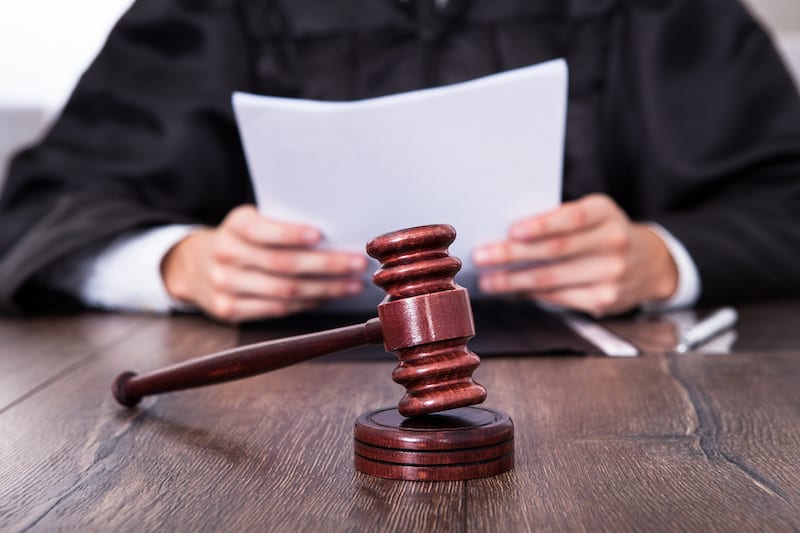
10 May Do Judges Attend Depositions?
Will A Judge Attend My Deposition?
Are you preparing for your first deposition and don’t really know what to expect? Legal processes are intimidating, especially when you’ve never been part of one before. Rather than letting you worry about all the unknowns, we’ll walk through the process together. In this article, I hope to put you at ease by answering all your questions about depositions.
So, do judges attend depositions? In short, no. More than likely, the only people who will attend your deposition will be you (the deponent), the lawyers from each party, and the court reporter. Depositions do not take place in the courtroom and do not involve judges – however, you are still under oath.
Less formal than a court appearance, depositions are still an important part of the trial process and require your preparation, as well as your most professional attire and attitude.
What Is a Deposition?
Before we get into some of your specific questions, let’s first make sure you know what a deposition actually is. A deposition is part of the investigative process of a legal case. During the deposition, opposing counsel will ask the deponent a series of questions to help them establish their case.
Most often, a deposition is a pretrial of sorts – it is preparation for a trial later on. This makes the deposition a very important piece of the process, even though judges are not present.
Deponents will go under oath, just like they would in a trial, and everything that is said is recorded by a court reporter. At the end of the deposition, each side will receive a copy of the report for their review, and to help them continue preparing their case.
Why Do Judges Not Attend Depositions?
Because depositions are part of the discovery/investigative stage of a trial, judges are not present. Everything that is revealed at a deposition will likely be repeated at trial – which is where judges will rule on the case.
Part of the reasoning behind not attending depositions is because there are only so many judges and there can be multiple depositions in just one case. If there are any objections or conflicts during the deposition, they will be dealt with at trial or at future court appearances. In high-profile cases, it is possible that a judge will be “on-call” in case of disputes over questions, but it is pretty rare.
Can Anyone Attend My Deposition?
Yes, essentially anyone that wants to attend is allowed to. It is pretty rare for people who are not involved in the case to attend the deposition. If you have family members or friends that would make you feel more comfortable, then they are legally allowed to attend.
Some people wish to have their friends and family attend to offer advice and moral support. Luckily, unless there is a protective order restricting them, there is nothing stopping them from being there for you throughout the process. You can learn more about who is allowed to attend your deposition here.
Can I Prevent Certain People From Attending My Deposition?
Depending on the case, relationships between the opposing counsel and the deponent can be quite complex. Sometimes, the presence of certain individuals at depositions can cause a distraction for the deponent and influence the whole process.
Fortunately, there are steps your lawyer can take to protect you from these instances. If there is a specific individual that would cause you difficulty, your lawyer can obtain a protective order that excludes them from attending the deposition.
What if someone you didn’t expect to be there shows up? Most of the time the deposition will have to continue. However, your lawyer can suspend the deposition and apply for a protective order before it resumes. You should talk with you counsel as soon as possible if you have concerns over certain people attending the deposition.
Will My Deposition Be Public?
Depositions are not part of the public record unless they are filed as official evidence in a case.
Oftentimes, depositions occur before trials, but sometimes the case does not make it to trial. If a case doesn’t make it to trial, but rather is settled outside of court then the deposition is not made public. At the conclusion of a deposition, the transcript will be given to both parties and reviewed for any errors. Transcripts may be used in trials, so checking for mistakes is very important. The transcript is also the piece of a deposition that becomes public if filed.Can I Skip Or Refuse a Deposition?
A deposition must be pursued through the use of a subpoena. A subpoena is a written order that compels a party to provide testimony that pertains to a case. The issuance of a subpoena in a deposition can result in punishment for those who ignore the summons.
Punishments for ignoring a summons without justification can include paying the expenses caused by the failure to appear – such as the attorney’s fees for the party that requested the deposition. There are some cases where the court may order that the offending party may not introduce certain matters into evidence. The court may even render judgment by default against the offending party.
Ultimately, refusing a deposition is in bad form and would not be a good idea. You should always consult your legal representative before making such a decision.
Let’s Review!
Taking part in a legal process can be intimidating – but lucky for you, you know what to expect now! Depositions are part of the discovery process prior to a trial taking place. Anyone can attend. However, it is rare for anyone other than the court reporter, deponent, and both legal counsels to be present.
Your lawyer can institute a protective order to restrict certain individuals from attending a deposition. You can rest assured that your deposition will be kept private and confidential unless it is filed as official evidence in a trial. Don’t refuse a summons to appear at a deposition. You will face penalties that can be very strict, and most often it will not benefit you to avoid it.
Hopefully, this article answered most of your questions, but if you are curious about anything else, please check out our other articles!
Related Questions
How Can Depositions Help or Hurt My Case?
Depositions can be very helpful in your case because they let you know ahead of time what to expect from the other party. Your lawyers will use this to their advantage by preparing better cross-examination questions for trial. The transcript from depositions can also be used as evidence that a witness is lying or telling a story different than they did before trial.
However, take note! This also works the other way around. Depositions are designed to help both parties establish their case. If you were to say something differently at trial than you did during the deposition, it can seriously hurt your case. Just as your lawyer can use the deposition transcript to measure inconsistencies, so can the opposing counsel. All this to say that if you are being deposed, just tell the truth.
What Can I Do to Prepare for My Deposition?
Your legal counsel will work with you before your deposition to prepare you for what to expect, but there are some things you can do on your own. Dressing appropriately is important – even though a deposition is less formal than a court appearance.
Business casual is the umbrella term, but basically:
- Close-toed shoes
- Slacks
- Button-down shirt
- No jeans, flip-flops/athletic wear
Apart from what to wear/not wear, you can gather any written documents that are important to the case. Your lawyer can help you determine what these might be, but it could include things like financial statements, any reports, or even a timeline of events that you created on your own.
What Makes A Deposition Successful?
If you are the deponent, a successful deposition will include:
- Preparing
- Telling the truth
- Not over-sharing information
- Staying calm
- Only answering the questions asked
Depositions are part of the discovery process, and as such information will be revealed. However, it is the opposing counsel’s job to ask the right questions to help establish their case. You should not provide them with any information that they did not specifically ask for.
By staying calm and answering truthfully, you should have nothing to worry about. Preparation with your lawyer will help you understand what kind of question to expect – which will help you to relax during the deposition.
If you stick with your truth, answer honestly, and don’t allow yourself to be bullied into saying anything then you can consider your deposition to be a success.





